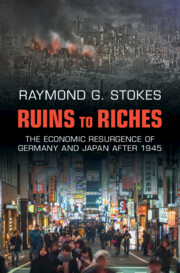Book contents
- Ruins to Riches
- Ruins to Riches
- Copyright page
- Dedication
- Contents
- Charts and Figures
- Acknowledgements
- Introduction
- Part I No Mere Incantation
- 1 From Foe to Friend
- 2 The Miracle Makers
- Part II Making Miracles, 1950–1973
- Part III Sustaining Miracles, 1973–1989
- Part IV Navigating Waves of Globalization, 1990 to the Present
- Notes
- Index
2 - The Miracle Makers
(Re-)Constructing Cooperative Capitalism
from Part I - No Mere Incantation
Published online by Cambridge University Press: 12 April 2024
- Ruins to Riches
- Ruins to Riches
- Copyright page
- Dedication
- Contents
- Charts and Figures
- Acknowledgements
- Introduction
- Part I No Mere Incantation
- 1 From Foe to Friend
- 2 The Miracle Makers
- Part II Making Miracles, 1950–1973
- Part III Sustaining Miracles, 1973–1989
- Part IV Navigating Waves of Globalization, 1990 to the Present
- Notes
- Index
Summary
To explain the economic miracles in Germany and Japan after the Second World War, we need to pay close attention to the networks of miracle makers, who drew upon skill and knowledge that existed before and during the war. Under Allied tutelage, and in cooperation with workers and other groups that had previously been excluded from decision-making, members of these networks fundamentally refashioned German and Japanese cooperative capitalism into something more suited both to the emerging post-war capitalist economic order and to peaceful existence within it. Most of the fundamental reforms to German and Japanese capitalism were in place by about 1950, as were the networks that would prove essential to producing the economic miracle. However, we need to bear in mind that the renewed and reformed systems of cooperative capitalism did not function well immediately; in fact, the West German and Japanese economies languished as the 1940s drew to a close. What proved essential were two things explored in the next chapters: first, fundamental recasting of manufacturing in firms of all sizes in both countries; and, second, vastly increased domestic consumption followed crucially by worldwide demand for all sorts of products as the capitalist world entered the Golden Age.
- Type
- Chapter
- Information
- Ruins to RichesThe Economic Resurgence of Germany and Japan after 1945, pp. 35 - 56Publisher: Cambridge University PressPrint publication year: 2024

